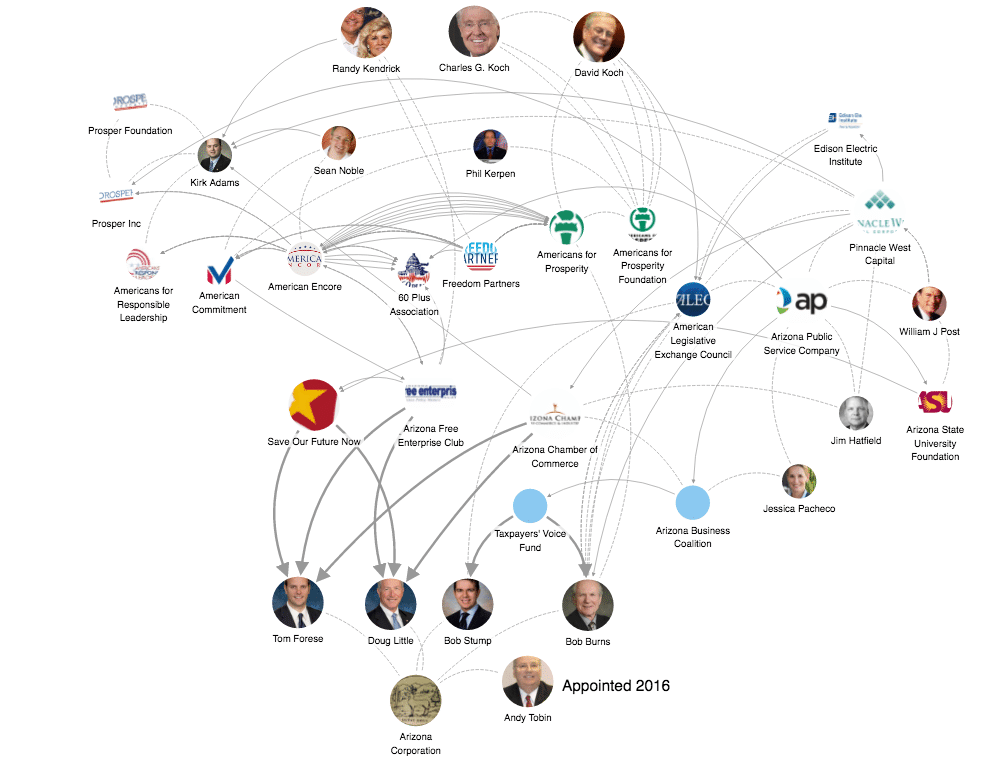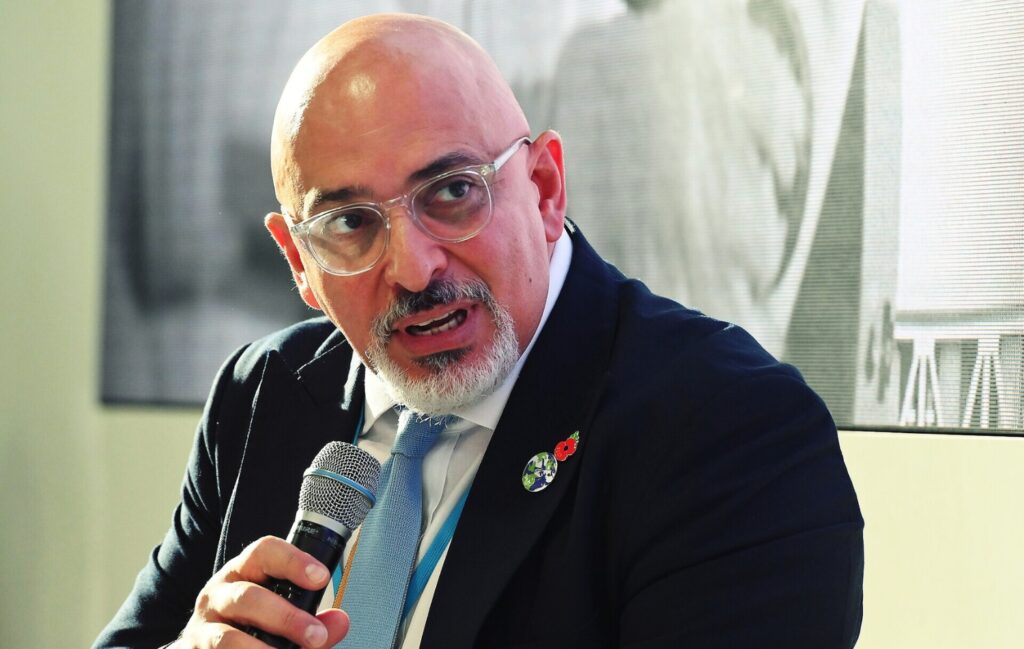The Arizona Corporation Commission (ACC), which regulates public utilities and telecommunications companies, is facing increased scrutiny by the FBI and backlash from state media outlets over its political activities and antagonistic position towards rooftop solar and net metering.
The ACC consists of five elected members. All current commissioners are Republicans, and at least three oppose residential solar energy generation. While the commission used to have more pro-solar members, outside forces have aided anti-solar candidates in recent years, cementing a commission hostile to the growing renewables industry.
A battle between big electric utilities and solar advocates has been waging for years, and soon the commission will again take up more solar issues and rate increase requests from numerous electric utility companies.
The Solar Fight
In 2006, the ACC created a strong Renewable Portfolio Standard, requiring utilities to generate or purchase 15 percent of their energy from renewable sources by 2025. Three years later, Arizona established net metering, a system that allows homes and businesses to sell excess solar energy they generate on their rooftops back to the grid at the retail electricity rate.
Without net metering, the market for residential and small-business solar energy plummets. Just recently in Nevada, ending net metering killed the rooftop solar industry in the state.
The ACC’s environmentally friendly coalition shrank in the 2010 and 2012 elections. Then in 2013, the state’s biggest electric utility, Arizona Public Service Company (APS), viewing residents as energy-generating competitors, funded an ad campaign to rally support for increasing costs on solar customers.
Solar companies including SolarCity and Sunrun started a competing spending group, Tell Utilities Solar won’t be Killed, or TUSK, which advocated keeping net metering in place. SolarCity provided most of the funding. In the end, the commissioners agreed on a roughly $5 monthly fee for solar customers, far less than the $50 to $100 fee proposed by APS.
Then the 2014 elections replaced two pro-solar Democrats on the commission with two very utility-friendly Republican commissioners.
SolarCity this year started a ballot-measure campaign to enshrine net metering into the Arizona constitution. APS responded by leaning on their friends in the state Senate to put two different measures to the ballot, both hostile to solar installers.
Pinnacle West, the holding company that own APS, is the top corporate contributor to the campaigns of GOP Sen. Debbie Lesko, the Arizona state chair of corporate bill mill the American Legislative Exchange Council (ALEC), who proposed one of the ballot initiatives. But SolarCity and APS decided to scrap the measures and took part in one failed mediated talk. Further discussions are suspended.
Now APS is calling for an 8 percent rate increase on its electricity customers, a huge drop in reimbursement rates for excess distributed solar energy, a large increase in the monthly fee for solar users and a new “demand charge” for these customers, which is a significant extra fee based on the customer’s highest average hour of usage each month. Other utilities have made similar requests.
Based on the commission’s entanglements with and favoritism towards APS, the rooftop solar industry could now be on the verge of collapse in Arizona.
So how did the makeup of the commission get so friendly with APS and hostile to non-utility-scale solar? DeSmog follows the money.
Electing Anti-Solar Commissioners
In 2012, Republicans Bob Burns and Susan Bitter Smith defeated two Democratic incumbents, and incumbent Republican Bob Stump kept his seat.
Two years later, Republican candidates Tom Forese and Doug Little, who have anti-solar views in line with those of APS, beat pro-solar Democrats Sandra Kennedy and Jim Holway for two open seats. Amidst a recent conflict-of-interest controversy, Bitter Smith resigned and anti-environmentalist and Koch favorite Republican Gov. Doug Ducey appointed former Republican State Rep. Andy Tobin to fill her seat at the beginning of 2016.
At the heart of the outside spending in the 2014 ACC races is the “social welfare” nonprofit Arizona Free Enterprise Club (AFEC), which was formed in 2005 and has spent millions on state-level races in Arizona for governor, state legislature, secretary of state and the ACC, without having to disclose its donors. AFEC earlier fought Arizona’s public campaign finance program before the U.S. Supreme Court, resulting in a 2011 decision that threw out part of the program.
In 2014, AFEC had its hands on the majority of the money benefiting the two victorious anti-solar ACC candidates. The group made direct independent expenditures in favor of Forese and Little, according to data compiled by the National Institute on Money in State Politics.
AFEC spent a combined $113,000 against Forese and Little’s Republican primary opponents Lucy Mason and Vernon Parker, who were considered to be pro-solar. In the general election, AFEC spent over $308,000 on ads supporting Little and Forese while also spending more than $32,000 attacking their two Democratic opponents, incumbents Sandra Kennedy and Jim Holway. Overall, AFEC dished out over $453,000 on independent expenditures benefiting Forese and Little.
But AFEC, which gives large sums of money to many groups, also sent a hefty $2.7 million to another Arizona-based secret-money group, Save Our Future Now (SOFN). That group spent nearly $2.5 million on outside expenditures benefiting Forese and Little: roughly $292,000 for Little; $290,000 for Forese; $832,000 against Parker in the GOP primary; $30,000 against Mason in that primary; and over $1.3 million against Kennedy in the general.
In 2013, APS gave $181,000 to the Arizona State University Foundation, which then gave $100,000 to SOFN, its only contribution that year to a 501c4 “social welfare” nonprofit. Bill Post, former chairman and CEO of Pinnacle West, was board chair of the foundation, a position he still holds.
The Arizona Chamber of Commerce also helped elect Forese and Little, to a lesser degree. The trade association spent over $61,000 on Forese and Little. Pinnacle West’s political action committee has given $15,000 to the Chamber’s PAC from 2013 to present. And Jim Hatfield, executive vice president and chief financial officer of Pinnacle West and APS, sits on the board of the Chamber.
In 2012, the Arizona Business Coalition, a “social welfare” nonprofit created by the Chamber, gave $7,500 to Taxpayers’ Voice Fund, a group set up entirely to help elect Republicans Bob Burns, Susan Bitter Smith and Bob Stump. The Voice Fund split almost $188,000 between the three candidates, making independent expenditures to their benefit. The Arizona Republic revealed that APS gave at least $101,000 to the business coalition.
In 2012, APS’s current vice president of state and local affairs Jessica Pacheco sat on the Arizona Business Coalition board, but disappeared from the list in 2013 after controversy over the group’s donations to the Voice Fund. She’s currently on the board of the Arizona Chamber of Commerce Foundation.
Pinnacle West has donated at least $35,000 to the Edison Electric Institute’s “Power PAC” since 2009, according to Federal Elections Commission data. The Edison Electric Institute is a member of ALEC, having worked with ALEC to create a model bill that attacked net metering. Burns was once an ALEC “Legislator of the Year.”
But Burns may subpoena APS regarding its political contributions, as he’s voiced concern over APS’s potential political spending. With Forese and Little fiercely defending APS’s right to donate anonymously to political groups, Stump’s frequent 2014 contact with Forese, Little, the executive director of AFEC and an executive with APS, and Ducey-appointed Tobin, Burns may be the only hope for any action on undisclosed political spending by ACC-regulated utilities such as APS.
The LittleSis map below follows the money and connects many of the individuals and institutions involved in the ACC elections.
The Koch Connections
Numerous local news outlets have stated that it’s “widely assumed” that APS, or Pinnacle West, was the primary source of AFEC’s 2014 political funding and spent $3.2 million total supporting the election of Forese and Little.
In 2013, APS admitted to The Arizona Republic that it sent money through Koch operative Sean Noble’s consulting firm to the Koch-linked 60 Plus Association and to Prosper, a free-market group founded by Koch-linked Kirk Adams, a former Arizona state legislator and current chief of staff to Ducey, who was elected governor with help from a host of Koch-backed groups.
Both 60 Plus and Prosper funded ads in 2013 criticizing net metering as “corporate welfare.” APS spent $9 million total on efforts attacking net metering in 2013.
It’s also possible that much of AFEC’s funding came out of the vast network of conservative mega-donors led by the Koch brothers. Founding director Randy Kendrick, a big Republican donor and close ally of the Koch brothers, reportedly resigned from AFEC’s board in mid-2014. She is “a leading Koch donor,” having attended the Kochs’ “donor summits” and teamed up with Charles Koch to found and fund a free-market academic center at the University of Arizona, which, along with two other similar centers, will now receive annual state funding. She introduced Sean Noble, the founder of the Center to Protect Patient Rights (now known as American Encore) to the Koch network.
Kendrick also sits on the board of the Goldwater Institute, a conservative think tank that has received donations from the Charles Koch Foundation and is known for pushing policies developed by ALEC, opposing renewable energy standards and subsidies for the solar industry. Strangely, Barry Goldwater, Jr., a board member and the son of the institute’s namesake, is chairman of the solar advocacy group TUSK.
Among the only known contributions to AFEC in 2014 are $450,000 from American Encore and $230,000 from American Commitment, formed in 2011, whose president is Koch operative Phil Kerpin and former director is Noble. Both groups are deeply tied to the Kochs, and AFEC gave hundreds of thousands to Koch-linked groups in 2014, including $710,000 to American Encore and $200,000 to the 60 Plus Association, indicating that AFEC could in fact be a conduit for secret donations from the Kochs, Kendrick and other conservative mega-donors.
AFEC also spent more than $752,000 supporting unsuccessful secretary of state candidate Justin Pierce and attacking his opponents. Pierce is the son of former Corporation Commissioner Gary Pierce, who’s now under investigation by the FBI and the Arizona Attorney General for potentially trading commission votes for outside aid to his son’s election effort. Pierce had numerous lunch dates with APS CEO Don Brandt and may have had a hand in helping elect Republicans to the commission in 2012.
This Year’s Race For Arizona Corporate Commission Seats
Three commission seats are up for grabs this year. Incumbents Burns and Tobin are running for reelection while Bob Stump has termed out. Democrats Bill Mundell, a former commissioner, and former state lawmaker Tom Chabin are running for two of the seats. On August 30, voters will choose their party nominees for the general election on November 8.
Mundell and Chabin, who are using what’s left of the state’s public campaign finance program, have taken strong stands against APS and the corrupt ACC, including this proposed ethics code for commissioners. Chabin told DeSmog that APS should “trust the voter and stay out of it … Putting $3 million into campaigns for an obscure office is buying an election.”
“Thirty years from now, the generation of electricity be far more localized,” Chabin said. Are we going to have a commission that will facilitate that destiny?”
None of the groups spending in the 2014 commission races have reported commission-related expenditures thus far this year, although the Republicans running this year appear sympathetic to APS, according to Chabin. With the primary only weeks away, it’s likely outside groups could kick into gear soon.
In April, the Arizona legislature passed a bill making political nonprofits’ elections activity essentially invisible and eliminating criminal enforcement for violations of campaign finance law. Ducey signed it less than 48 hours later.
Subscribe to our newsletter
Stay up to date with DeSmog news and alerts






